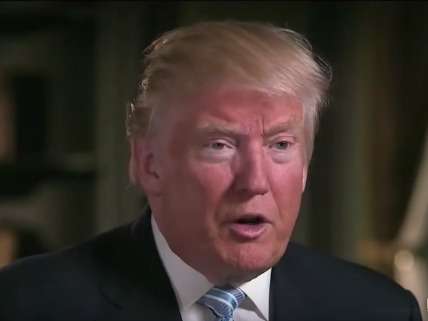To Stop Terrorism, Trump Wants to Block Immigration From Most Countries
"I'm talking territory instead of Muslim," he says, but adds that the Constitution "doesn't necessarily give us the right to commit suicide."

In an interview on NBC's Meet the Press yesterday, Donald Trump offered yet another version of his plan to fight terrorism by restricting immigration. What was originally "a total and complete shutdown of Muslims entering the United States until our country's representatives can figure out what is going on" has now become a suspension of "immigration from any nation that has been compromised by terrorism until such time as proven vetting mechanisms have been put in place."
What does it mean for a country to be "compromised by terrorism"? Since Trump said "we have problems in Germany and we have problems with France," he seems to have in mind not just countries that sponsor terrorism or host terrorist groups but any country where terrorism occurs. That would cover the vast majority of countries, including the United States itself and U.S. allies such as Australia, Canada, the U.K., the Netherlands, Denmark, Italy, and Israel. According to a 2015 report from the Institute for Economics and Peace, just 45 of the 162 countries it examined had no terrorist attacks in 2014. Hence when Meet the Press host Chuck Todd suggested that the latest iteration of Trump's exclusion proposal "feels like a slight rollback," Trump responded that "you could say it's an expansion."
The main advantage of the new plan, Trump said, is that "I'm looking now at territories." He explained the lesson he learned from criticism of his original plan, which was condemned even by the man who later became his running mate. "People were so upset when I used the word Muslim," he said. "'Oh, you can't use the word Muslim.' Remember this. And I'm OK with that, because I'm talking territory instead of Muslim." But if the territory talk is simply a cover for excluding Muslims, as Trump seems to be suggesting, that would be equally unconstitutional. As the American Civil Liberties Union notes, "intent to discriminate on the basis of religion, even hidden behind pretextual religious neutrality, violates the Establishment Clause and Equal Protection."
Trump's treatment of the constitutional issue gives you a sense of how much he cares about civil liberties:
Our Constitution is great. But it doesn't necessarily give us the right to commit suicide, OK? Now, we have a religious, you know, everybody wants to be protected. And that's great. And that's the wonderful part of our Constitution. I view it differently.
Why are we committing suicide? Why are we doing that? But you know what? I live with our Constitution. I love our Constitution. I cherish our Constitution.
The phrase Trump vaguely remembers is "the Constitution is not a suicide pact," a favorite refuge of authoritarians. Taken literally, it means the government should not be so punctilious about following the Constitution that the nation's very existence is threatened. But terrorism does not represent an existential threat to the United States, so even if Trump's proposal were an effective way to stop terrorism, failing to adopt it would not amount to anything like suicide. In practice, however, the phrase is often applied to situations that fall far short of existential threats.
The first time the phrase was used in a Supreme Court opinion, for instance, the threat was an inflammatory speech that a suspended Catholic priest named Arthur Terminiello delivered to the Christian Veterans of America in Chicago. Terminiello was convicted of disorderly conduct based on a jury instruction that equated that offense with behavior that "stirs the public to anger, invites dispute, brings about a condition of unrest, or creates a disturbance." Overturning Terminiello's conviction in a 1949 opinion by Justice William O. Douglas, the Supreme Court noted that "a function of free speech under our system of government is to invite dispute." In fact, the Court said, speech may "best serve its high purpose when it induces a condition of unrest, creates dissatisfaction with conditions as they are, or even stirs people to anger. Speech is often provocative and challenging. It may strike at prejudices and preconceptions and have profound unsettling effects as it presses for acceptance of an idea."
Dissenting from that decision, Justice Robert Jackson perceived "a danger that, if the Court does not temper its doctrinaire logic with a little practical wisdom, it will convert the constitutional Bill of Rights into a suicide pact." But the real danger is the one Douglas described: that treating words as disorderly conduct when they upset people effectively criminalizes controversial speech. In fact, the standard at issue in Terminiello v. Chicago could easily be applied to Donald Trump's speeches, especially given the violence at some of his rallies. Trump would rightly object if he were arrested for saying things police deemed excessively provocative. But that is where loose talk about suicidal civil liberties leads.
The fact that Trump deems it necessary to invoke suicide in this context suggests he worries that his immigration plan would be unconstitutional even if he didn't "use the word Muslim." But that would depend largely on what Trump means by "proven vetting mechanisms." Elaborating on the concept, he explained that he has in mind "extreme vetting," which he described as a "tough word." Since Trump himself has no clear idea what he is proposing, it's hard to say whether it would be constitutional.


Show Comments (56)